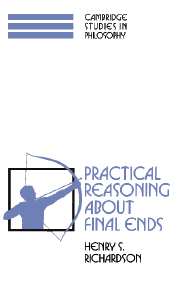I - Introduction
Published online by Cambridge University Press: 05 June 2012
Summary
Despite its broad practical importance, the question whether we can reason practically about final ends may strike an archaic note. To show that relegating this question to the ersatz battleground of discarded philosophies would be a mistake, I begin by explaining my topic and its significance (§1). I then describe how some rather diffuse philosophical stances – ones that ultimately should be discarded – have made deliberating about ends seem impossible (§2). The reader will then request, and be granted, a preview of my argument as a whole and an indication of those more particular opponents against whom I will be arguing (§3). To explain the topic, I begin with an example.
THE ISSUE
Having children is not for everyone a matter of deliberation. I do not simply mean that it can be the result of mistake or coercion. Far more commonly, it is blandly accepted as a natural, if not automatic, concomitant of marriage. What could be more traditional? Yet for some couples propagation is a matter of deliberate choice. Moral issues may impinge on this choice. An educated professional in an industrialized country, sufficiently worried that population growth will cause more pollution than the world can absorb, may refrain from having more than one child. The injustice and cruelty of the world may so disgust an impoverished citizen of a developing country that she refuses to bring a child into it.
- Type
- Chapter
- Information
- Practical Reasoning about Final Ends , pp. 3 - 21Publisher: Cambridge University PressPrint publication year: 1994



